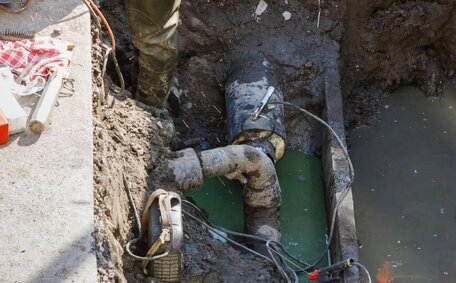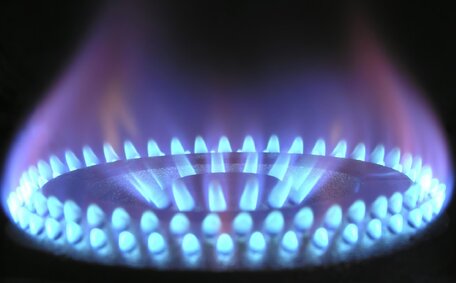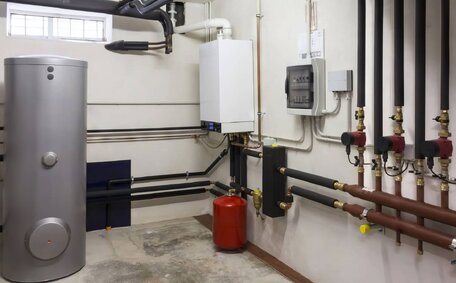
Sump Pump Failure Solutions
Sump pumps fail due to power outages, clogs, frozen pipes, and more. Prevent water damage by understanding causes and contacting plumbers for solutions to extend pump life.
Read MoreIn residential plumbing, the choice of pipe materials is crucial for emergency situations. Cronulla’s varying climates place significant stress on plumbing systems. Knowing which type pipe stands up best to freezing and other extreme conditions allows us to prevent pipe failures and water damage.
Today, the most common pipes made available are copper, PVC, PEX, and CPVC. Copper offers durability but is prone to pinhole leaks over time. PVC is affordable and can withstand freezing, but it has limitations handling hot water.
Each pipe material comes with its own advantages and drawbacks for consideration.
As local plumbers serving the Cronulla area, we’re here to see how pipe materials react in situations like sudden deep freezes when pipes are exposed. Some materials better resist pressure and freezing temperatures. We offer insights on optimal choices for your home’s plumbing system, adopting strategies from the United States to reduce emergency pipe repairs.
For residential plumbing in Cronulla, commonly used pipe types are copper, PVC, PEX, galvanised steel, and stainless steel.
Copper - Noted for its durability and resistance to corrosion, copper is commonly utilised for both hot and cold water supply lines. However, it can be more costly and is susceptible to pinhole leaks over time.
PVC - Lightweight and affordable PVC holds up well in freezing temperatures. But it can’t withstand sustained hot water flow over 160°F.
PEX - Flexible PEX pipe doesn’t corrode and prevents freezing damage. With proper installation and support, it’s also suitable as a sturdy choice for hot and cold supply lines.
Galvanised steel - Once very common, galvanised pipes are falling out of favour due to corrosion issues that reduce water flow over time.
Stainless steel - While it comes at a higher price, stainless steel is durable across a broad temperature spectrum and is less prone to corrosion than galvanised steel, making it well-suited for high-temperature environments.
When selecting pipe material, factors like climate resilience, pressure ratings, hot water needs, and cost should be weighed. Our Cronulla plumbing expertise guides homeowners toward options that minimise the risk of pipe emergencies.
Copper, known for its durability and corrosion resistance, is among the most used pipe materials. In Cronulla’s coastal environment, copper holds up very well compared to other materials. The lack of corrosion allows good water flow to be maintained over decades.
Despite its durability, copper may develop pinhole leaks from acidic water, whereas some materials outperform in this regard. These small leaks may go unnoticed until there is visible water damage. Repairing pinholes in supply lines involves replacing whole sections of pipe.
Stagnant water in copper pipes during freezing weather presents a moderate risk of damage. As water expands when frozen, it can rupture copper pipes. Insulating materials protect copper pipes to approximately -7°C.
Compared to PEX tubing, copper pipes generally withstand freezing with less risk of bursting. But the repairs may be more labour intensive and costly if pipe sections need wholesale replacing rather than just a slipped coupling as with PEX.
To prevent pinhole leaks from corrosion, we suggest Cronulla homeowners inspect their copper water lines triennially. This allows any weaknesses to be found before failure. We’re happy to assess your plumbing and suggest upgrades that reduce emergency repairs.
PVC, known as polyvinyl chloride, is a favoured option for plastic pipes, valued for its lightweight nature, cost-effectiveness, and user-friendliness. Although durable, PVC’s limitations render it less suitable for some residential plumbing applications.
PVC is not recommended for drinking water supply lines due to its potential for chemical leaching over time. Although it resists freezing, PVC piping can still burst if water inside it freezes, highlighting its unsuitability for high-temperature usage.
PVC tends to warp and bend under the duress of prolonged high temperatures or exposure to uv light. So it doesn’t work well for circulating hot water lines or outdoor installation in sunny Cronulla.
PVC pipes’ affordability makes them ideal for underground drainage systems. Properly buried PVC holds up for decades in most soil conditions. We recommend a professional plumbing inspection every 5 years to check for any leakage or joint issues.
As Cronulla plumbers, we’re happy to discuss PVC’s pros and cons and whether it makes sense for your residential water or sewer lines. Reach out anytime to learn about pipe options that stand the test of time and avoid emergencies.
PEX, or cross-linked polyethylene, has gained popularity in recent years as an affordable and flexible alternative to metal pipes. As Cronulla plumbers, we often find it beneficial to use PEX for water supply lines.
PEX pipes, derived from PVC, are reinforced to withstand temperatures from the freezing point to 93°C. This makes it ideal for hot water circulation lines. The crosslinking also provides excellent corrosion resistance.
Unlike copper and galvanised steel, PEX won’t develop pinhole leaks over time. Installers find PEX easier to handle than rigid metal pipes. PEX tubing unrolls and connects via simple push-fit or compression fittings.
For those in Cronulla worried about pipes bursting due to freezing temperatures, PEX greatly reduces this risk. It’s important to note that improperly supported PEX may incur damage from expanding ice within, highlighting the importance of correct installation.
PEX piping is an economically smart, flexible, and freeze-resistant solution for numerous residential applications. As your local experts, we’re here to advise whether it may fit your plumbing renovation or new build.
When temperatures plummet, the susceptibility of different pipe materials to freezing and bursting varies greatly. It’s pivotal for Cronulla homeowners to understand which kind pipe best prevents pipe emergencies.
Water’s volume expands by up to 9% when frozen, causing significant pressure on containment. In plumbing systems, this stress can cause pipes to crack and burst.
Copper - While durable, copper pipes are still at risk of bursting when water freezes inside. Insulation helps protect copper pipes to around 20°F.
PVC - PVC holds up better to freezing than metal pipes. Stagnant water expanding upon freezing can still rupture PVC pipes. Insulated PVC can withstand temperatures down to -20°F.
PEX - Flexible PEX tubing is highly freeze-resistant and the least likely pipe material to burst in icy conditions. With proper installation, PEX can endure freezing with minimal risk.
As Cronulla plumbers, we’re happy to assess your pipe system and recommend the best materials and insulation methods to prevent winter emergencies. Protecting pipes from freezing is much less costly than repairing the damage.
When comes to frigid winter temperatures, steps should be taken to prevent pipes from freezing and bursting. Here are some tips we recommend Cronulla homeowners follow:
Taking preventative measures can save Cronulla homeowners significant expense and headaches from burst pipes come winter. We’re happy to assess your plumbing system and recommend the best winterization plan.
Appropriate pipe insulation is key to preventing freezing and burst damage, particularly during Cronulla’s cooler months, as it impedes heat transfer and keeps the water within from reaching freezing point.
Pipes in areas needing extra protection, such as unheated garages or crawl spaces, should be wrapped with foam insulation to guard against cold temperatures. Secure it using tape or clamps, with no gaps where air pockets could form. This insulation protects pipes down to about 20°F.
For inaccessible supply lines buried in walls and floors, insulating the crawl spaces, basements or garages they run through is smart. Sealing cracks and adding batt insulation maintains warmer ambient temperatures around the pipes.
Heat tape or cables may also be warranted for extra freeze protection in certain cases. These wrap around pipes and heat via electricity to keep the temperature above freezing.
As Cronulla plumbers, we’re happy to assess your pipe system and recommend the optimal insulation methods and materials needed to withstand winter extremes. Proper insulation is the most cost-effective way to avoid burst pipes and water damage.
Maintaining a consistently warm indoor environment is essential to safeguard your pipes from freezing and potential burst damage throughout the colder months in Cronulla. We recommend homeowners maintain thermostat settings no lower than 15°C throughout the home.
Allowing temperatures to drop too low, especially overnight and while away, can lead to water freezing within pipes. Even a few hours below 5°C puts plumbing at risk. Ensure all living areas with pipe runs are properly heated and insulated.
In two-storey homes, it’s crucial to prevent heat loss upstairs since supply lines often run through the colder lower level. Keep all internal doors open so heat circulates freely to reach vulnerable pipe locations.
Sealing any cracks, gaps, or openings in exterior walls and around windows will better hold in warmth too. Draught blocking is wise to retain heat and reduce chill reaching pipes. We’re happy to assess your home’s envelope and recommend insulation improvements as needed.
Vigilantly monitoring forecasts for extreme cold snaps allows you to take proactive measures like dripping faucets ahead of time. Consistently maintaining safe indoor temperatures through winter is key to avoiding pipe emergencies and costly repairs.
A slow drip from taps during intense cold is effective in preventing water from freezing inside pipes; movement reduces the risk. The continuous movement relieves pressure buildup from any expanding ice inside pipes.
It is advised that indoor sinks release a small flow of 2-3 drops per minute, which can prevent freezing without causing significant water wastage.
Outdoor spigots should drip slightly faster at 5 drops per minute as they experience colder exposure.
Along with other preventative measures like insulation and thermostat vigilance, dripping faucets provides affordable insurance. It also allows pipes to gradually thaw if freezing conditions persist for many days. And know how to safely shut off water mains in a pinch.
Consider utilising timers to automate the dripping of your pipes, ensuring a consistent flow without constant monitoring.
There are a few key signs that indicate your plumbing system may be due for an upgrade. If you have pipes that are over 30 years old or experiencing frequent leaks, it’s important to deliberate on the replacement when required. Certain materials like galvanised steel tend to corrode internally over decades, greatly reducing water flow.
Upgrading old pipes to new materials can provide improved freeze resistance, pressure capacity, and longevity. Copper and galvanised steel pipes have a lifespan around 50 years before needing replacement. Modern PEX piping will easily outlast most homes at over 100 years with proper initial installation.
For Cronulla homeowners, the coastal environment also plays a role in material longevity. We’re happy to assess your existing plumbing and recommend the best replacements suited to Cronulla’s conditions.
The salty air characteristic of coastal environments accelerates metal pipe corrosion, whereas PEX and PVC plastics demonstrate superior resistance to such deterioration.
It also prevents much more costly emergency repairs in the long run.
Sump pumps fail due to power outages, clogs, frozen pipes, and more. Prevent water damage by understanding causes and contacting plumbers for solutions to extend pump life.
Read MoreIf your monthly gas bill rises suddenly for no clear reason, the cause could be a gas leak from old pipes or appliances. Contact your provider to investigate.
Read MoreScale buildup reduces the efficiency of hot water systems over time. Regular descaling helps remove this. Flush your system with vinegar or a descaling solution.
Read MoreCronulla, 2230 NSW
We will call back as soon as possible.




